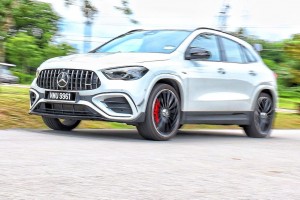BERLIN: Electric cars may be the rage when it comes to finding a more environmentally friendly way to drive, but one other frugal alternative has been making the rounds for years: the natural gas vehicle or NGV for short.
NGVs are comparatively environmentally friendly and are easy on your wallet when they need refuelling. Things are a little different when making the initial investment however, and NGVs come with a premium.
Depending on the price of fuel where you live, natural gas can be as much as half the price of diesel. Some governments have even added tax incentives to push drivers to switch to LPG (liquefied petroleum gas) and CNG (natural gas).
But you'll need those extra savings, because to drive a NGV, you'll have to dig much deeper into your pockets when making the initial purchase. So how do you get one more cheaply?
Depending on the model, you may be able to get a used NGV for the same price as a diesel or petrol counterpart, albeit only if the mileage is higher than 60,000km, according to specialist mag Auto Motor Sport.
The experts say you don't necessarily need to go for a brand-new model, and that it often makes sense to look for a used natural gas car where the additional cost usually disappears over time.
Factory installed or retrofitted
With natural gas cars, it's key to make the distinction between systems installed ex works and retrofitted solutions.
If a petrol or diesel car has been modded to run on natural gas, you'll want to examine it more closely, as these are known to have problems related to how the system was installed.

All work on a car gas system should only be carried out by certified specialist companies. Before buying a used car, it's also important to make sure that a specialist company has carried out the necessary modifications and maintenance, the experts say.
But all this is unnecessary if the car was designed for running on natural gas at the factory. This is generally always the case with CNG, because retrofitting is often too expensive. An LPG conversion is not cheap either and costs around 2,500 euros in Europe.
Environmentally friendly and flexible
In addition to the long-term savings, the environmental aspects and flexibility are the main arguments in favour of natural gas cars.
Natural gas burns up in a less damaging way than petrol or diesel does, and it produces up to 25 per cent less CO2 than a petrol engine. Nitrogen oxide and fine dust emissions are also lower.
And unlike on electric cars, you don't need to worry about running out of juice without somewhere to refill nearby.
If the tank is empty or there's no natural gas at the next filling station, you can simply continue on petrol, as you might with a plug-in hybrid. All you have to do is flip a switch.
However, there is usually one more or less painful disadvantage with NGVs: storage space. The load volume of the boot shrinks a little because the floor of the trunk has to be slightly higher than usual to make room for the gas tanks underneath it.












